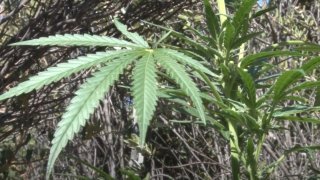
A screen shot from a marijuana-grow seizure operated by EPIC
With all the places to legally buy cannabis in the state of California, it's easy to forget that it's still part of a flourishing black market.
That fact was highlighted Tuesday when the office of the state's attorney general, Rob Bonta, said that law enforcement's Eradication and Prevention of Illicit Cannabis (EPIC) program had seized a mind-boggling 774,829 illegally cultivated plants so far this year, as well as more than 100,000 pounds of pot ready for that black market. Officials estimate the contraband would have sold for more than $353 million.
Stream San Diego News for free, 24/7, wherever you are with NBC 7.
While the numbers in San Diego are dwarfed in comparison with Riverside County's — where agents interdicted 79 sites, where 136,601 plants were growing — they will still shock some: 7 sites, 9,301 plants eradicated.
As shocking as the numbers are, an exception is glaring: Humboldt County, in the so-called Emerald Triangle, long reputed to be the biggest cannabis growing are in America, is not among the county's EPIC operated in. NBC 7 has asked the attorney general to comment on and is waiting to hear back.
Get top local San Diego stories delivered to you every morning with our News Headlines newsletter.
“The EPIC program was forged out of our recognition of the need for a more comprehensive approach that addresses the broader implications of the underground cannabis market," Attorney General Rob Bonta said, in part, in a news release sent out on Tuesday. "This includes tackling the environmental damage caused by these illicit activities, as well as the economic ramifications that arise from unregulated cultivation. Furthermore, there is a growing concern about labor exploitation within this underground market, where workers may face unsafe conditions and unfair treatment."
EPIC also conducted seizures in the following California counties:
- Alameda: 1 site, 751 plants eradicated
- Butte: 5 sites, 4,397 plants eradicated
- Colusa: 3 sites, 10 plants eradicated
- Contra Costa: 2 sites, 5,010 plants eradicated
- El Dorado: 8 sites, 2,174 plants eradicated
- Fresno: 31 sites, 52,796 plants eradicated
- Glenn: 1 site, 747 plants eradicated
- Kern: 60 sites, 89,819 plants eradicated
- Kings: 1 site, 539 plants eradicated
- Lake: 48 sites, 42,776 plants eradicated
- Lassen: 1 site, 7,359 plants eradicated
- Los Angeles: 3 sites, 3,684 plants eradicated
- Madera: 3 sites, 1,230 plants eradicated
- Mariposa: 2 sites, 1,368 plants eradicated
- Nevada: 33 sites, 28,428 plants eradicated
- Sacramento: 13 sites, 46,042 plants eradicated
- San Bernardino: 23 sites, 27,845 plants eradicated
- Santa Barbara: 1 site, 362 plants eradicated
- Santa Clara: 2 sites, 1,012 plants eradicated
- Shasta: 67 sites, 51,289 plants eradicated
- Siskiyou: 98 sites, 67,943 plants eradicated
- Stanislaus: 6 sites, 5,103 plants eradicated
- Tulare: 7 sites, 5,468 plants eradicated
- Tuolumne: 2 sites, 7,637 plants eradicated
- Ventura: 3 sites, 7,891 plants eradicated
- Yuba: 2 sites, 1,164 plants eradicated
Trinity and Mendocino counties, the two other legs of the Emerald Triangle, however, made the list:
- Mendocino: 116 sites, 133,702 plants eradicated
- Trinity: 38 sites, 32,381 plants eradicated
Officials also noted that many of the plants were being grown in state parks, with no oversight regarding irrigation runoff that can pollute waterways and otherwise damage the pristine natural environments.
Local
"Unfortunately, illegal cannabis cultivation is a serious threat to that land with more than 400 sites documented," California State Parks Law Enforcement Assistant Chief Jeremy Stinson is quoted as saying in the news release, adding that protecting "our state’s natural resources for all Californians and future generations is an important part of our mission."
And so it's understandable that EPIC's agents found more than just cannabis during its operations, including 201 weapons and containers of such toxic chemicals as carbofuran, methyl parathion, aluminum phosphate and zinc phosphide.
"Carbofuran, in particular, poses untold risks to public health," the news release stated. "A lethal insecticide that is effectively banned in the United States, carbofuran remains on plants after application and seeps into soil and nearby water sources."



